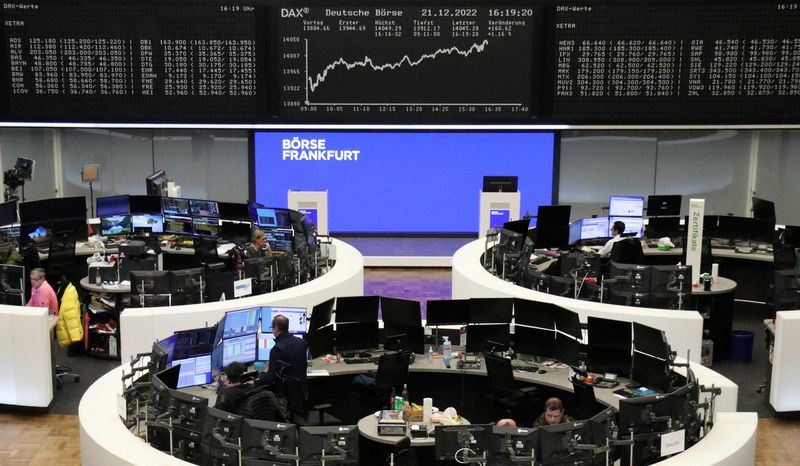By Amruta Khandekar and Bansari Mayur Kamdar
(Reuters) -European shares reversed early gains on Thursday, as hopes of easing inflation gave way to fears of aggressive monetary policy tightening in the world's largest economy after better-than-expected U.S. economic data.
The region-wide STOXX 600 index closed 1.0% lower after rising as much as 0.5% earlier in the day.
European shares posted strong gains in the previous session as improving consumer sentiment in the eurozone eased some of the concerns about economic downturn.
The festive mood quickly faded as Wall Street's main indexes dropped after data indicating a tight labour market and an upward revision to GDP exacerbated concerns that the U.S. Federal Reserve's monetary policy will hover at restrictive levels for longer than many market participants hoped.
Traders and analysts also said thin trading volumes ahead of the holidays influenced market moves.
"High inflation, an ensuing euro area recession and tighter financial conditions are exposing cracks in the financial plumbing," analysts at Generali (BIT:GASI) Insurance Asset Management wrote in a note.
"As central banks tap deeper into restrictive territory and the European Central Bank (ECB) joins the quantitative tightening wave, they will need to tread carefully to not unsettle markets."
London's blue-chip FTSE 100 slipped 0.4% after data showed Britain's economy contracted more than expected in the third quarter.
Rate-sensitive technology stocks slid 2.5%.
Semiconductor companies such as ASML Holding (NASDAQ:ASML) and Infineon (OTC:IFNNY) Technologies slid more than 3% each, tracking the drop in their U.S. peers after chipmaker Micron Technology Inc (NASDAQ:MU) forecast a steeper-than-expected second-quarter loss.
Concerns of economic recession as central banks adopt aggressive monetary policy tightening have hit European equities hard this year.
The STOXX 600 has fallen about 12.4% so far in 2022, but it has still outperformed the benchmark U.S. S&P 500 index, which has declined 20.8% and is on track for its worst yearly performance since 2008.
Euro zone bond yields extended the upward march kicked off by last week's ECB meeting.
"Bond volatility – even if past peak – remains high, the liquidity of even highly liquid assets such as U.S. Treasuries has deteriorated while high quality collateral shortage has mounted, especially in Europe," the analysts at Generali added.
"Banks will suffer from rising provisioning needs."
Banks slipped 0.4%, after briefly touching their highest since March.
Limiting losses, Denmark's Sydbank rose 3.0% after upgrading its full-year net income outlook.

Shares of peers Jyske Bank and Danske Bank gained 2.6% and 1.6%, respectively.
German-based Rheinmetall jumped 2.4% after the defence firm said it was supplying Ukraine with new logistic trucks.